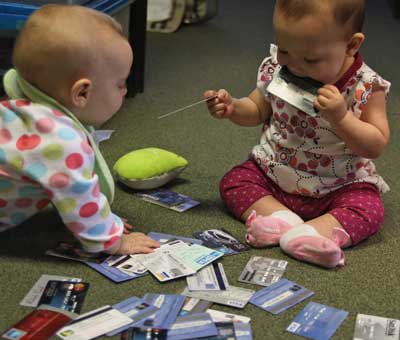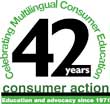Released: August 01, 2013
Consumer Action INSIDER - August 2013
Table of Contents
- What people are saying
- Did you know?
- Cordray nomination spells sweet success for consumers
- Hotline Chronicles: Review your ‘Medigap’ plan regularly
- ‘Bring Your Baby to Work Day’ at San Francisco office
- Fight to save Lifeline phone subsidy continues
- Timely updates keep our educational materials au courant
- Databases are crucial to Consumer Action’s mission and activities
- Coalition efforts roundup: Medical collections, payday lending, student loans and more
- Mid-Atlantic and California groups learn about electronic banking
- Consumer Action conference tackles 'Do Not Track' issues
- About Consumer Action
What people are saying
As always, the information that Consumer Action provides is relevant to the times. Online banking is scary and not for everyone. I learned some tools to safeguard [our personal information]. Thanks Consumer Action for always keeping us informed. — Vernice Turner, Coppin Heights Community Development Corporation
Did you know?
It can be difficult to recognize when a car repair quote is fair versus overblown, particularly if it's for a repair you haven't had done before. AutoMD is an online tool and app that tells you what a particular type of repair should cost on your model vehicle in your ZIP code. Search results include cost estimates broken down by labor and parts, based on whether you have the work done by the dealership, an independent repair shop, or tackle the project yourself. There are also how-to videos and guides for do-it-yourselfers. Learn more.
Cordray nomination spells sweet success for consumers
After more than two years of political gridlock and countless hours of active support by consumer advocates, including Consumer Action, the Senate on July 16 voted to confirm Richard Cordray as director of the Consumer Financial Protection Bureau (CFPB). Twelve Republicans joined Democrats in a 66-34 vote for Cordray’s confirmation.
Cordray, a former Ohio attorney general, has been serving as CFPB director since his recess appointment by President Barack Obama in January 2012. He now starts a five-year term as head of the consumer watchdog agency.
The future of the CFPB was threatened by Senate inaction to confirm Cordray. Eventually, Senate Majority Leader Harry Reid (D-NV) threatened to change the Senate’s rules to stop Republicans from blocking the president’s nominees. The Los Angeles Times wrote on July 11: “According to the official Senate historian, lawmakers have never before blocked a nominee because they didn’t like the way an agency was structured.” Industry lobbyists, too, had worked overtime to destroy the Bureau.
If not for the hard fight by consumer advocates and the influence of the media—major newspapers ran editorials calling for Cordray’s confirmation—the outcome might have been grim. On the day of the vote, consumer advocates sent Reid more than 160,000 signatures they had collected from citizens in favor of Cordray’s confirmation.
“Consumer Action remains committed to protecting the CFPB so it can continue to fulfill its duty to detect and destroy unfair and deceptive practices in the marketplace,” said Ruth Susswein, deputy director of national priorities in Consumer Action’s DC office. “We congratulate the CFPB for a remarkably successful first two years.” Consumer Action, as an active member of Americans for Financial Reform, has spent countless hours working to ensure that the agency can live up to its promise and push back against forces that would like to destroy it.
The CFPB can now continue building on its achievements, which include:
- returning $430 million to wronged consumers;
- developing rules of the road for mortgage lending and loan servicing;
- rooting out harmful practices, like discrimination and debt traps;
- creating new safety guidelines for money transfers overseas; and
- collecting and resolving consumer complaints on student loans, credit cards, mortgages, debt collection abuses and more.
Find more information about the CFPB on its website.
Hotline Chronicles: Review your ‘Medigap’ plan regularly
Dora* from Long Island, NY had a problem with her Medicare supplemental insurance. Medicare supplemental (“Medigap”) insurance, sold by private companies, can help pay some of the health care costs that Medicare doesn't cover, like copayments, coinsurance and deductibles.
Dora, 87 years old, purchased a supplemental policy through AARP when she became eligible for Medicare in 1991. The policy, for which she paid about $230 per month in 2013, had always seemed adequate to her, as it covered any costs not covered by Medicare when she visited the doctor. In January, Dora had a knee replacement and spent three days in the hospital, then was admitted to a rehabilitation (“skilled nursing”) facility to get her back on her feet. Complications in her rehab occurred and she remained in the skilled nursing facility for three months.
A few weeks after Dora’s discharge, a bill came from the facility to say that the supplemental insurance policy would not pay for the skilled nursing coinsurance bill of $9,000, although Medicare had paid for the bulk of the $62,000 bill. Dora learned that her supplemental policy did not cover skilled nursing care. In the three months she spent at the facility, no one realized this.
The bad news is, Dora is on the hook for $9,000. The facility offered a payment plan but insisted she pay more than $1,000 per month because they could not offer payment plans for more than six months. In order to avoid any damage to her credit report, we suggested she offer to pay as much as she could each month to avoid having the account go into collections. In subsequent conversations with the facility, Dora learned that plan would work as long as she didn’t miss a payment.
Consumer Action also suggested that Dora get a new supplemental policy. Interestingly, she learned she could get AARP’s best supplemental policy—covering skilled nursing and other “bells and whistles”—for roughly the same monthly payment.
Dora’s story is an important one for seniors and family caregivers because it illustrates the need to review your insurance policies on a regular basis to ensure your coverage is complete. It also provides a reminder to call your insurance company before electing to have any surgery or costly medical procedure. If Dora had done so, she could have saved $9,000.
You can buy a Medigap policy from any insurance company that’s licensed in your state. Always compare policies offered by different companies to get the one that’s best for you. Those who have had certain medical conditions may pay a higher monthly premium, as will people who smoke. Medigap policies generally don't cover long-term care, vision or dental care, hearing aids, eyeglasses or private-duty nursing. Before applying for any supplemental policy, thoroughly review the coverage to make sure the plan meets your needs.
For more information about supplemental policies, visit Medicare.gov.
AARP offers educational articles on Medicare and Medigap insurance. The senior organization endorses AARP Medicare Supplement Insurance Plans insured by UnitedHealthcare Insurance Company. To ensure you get the most accurate plan information online, make sure you specify the state you live in in the upper right-hand corner of the home page.
*Not this consumer's real name.
‘Bring Your Baby to Work Day’ at San Francisco office
We don’t know if there is “something in the water” at our San Francisco office, but three of our staffers are parents of new babies, aged 6 months to 12 months. One day last month was pronounced “Baby Day” and all three infants showed up to learn the ways of wise consumers.
As budding consumer advocates, the babies found time to hone their fledgling skills in a number of key areas.

How to choose (or is it “chew”) the right credit card |

The benefits of cooperative purchasing |
|

Differentiating between wants and needs |

Strategies for online comparison-shopping |
All three babies found Baby Day to be a great success. Asked to comment, one of the babies remarked, “Baaaaa.” According to our experts this means: “I highly recommend that other organizations consider having a Baby Day of their own.”
Fight to save Lifeline phone subsidy continues
Consumer Action has joined with other prominent advocacy organization to save the low-income phone subsidy program known as Lifeline. The program is under attack by conservative factions, who claim fraud is rampant, especially for wireless Lifeline. Participating organizations are planning public outreach efforts during “National Telephone Discount Lifeline Awareness Week,” from Sept. 9-15. Efforts will include education and opportunities to sign up for the Lifeline program.
Lifeline proponents believe that the program is too valuable to become a political football and that allegations of waste and abuse are being blown out of proportion. Federal Lifeline anti-fraud efforts have been stepped up considerably in the past two years. In June, the Federal Communications Commission (FCC) took further steps to ensure that providers verify eligibility of new subscribers before initiating service. (Despite the FCC’s earlier directives under the Lifeline Reform Order, some wireless providers had been activating phones for consumers before fully verifying their eligibility.)
FCC Acting Chairwoman Mignon Clyburn said, “These reforms saved over $200 million in the first year alone, and are on track to save $2 billion by the end of 2014.”
“In our increasingly interconnected world, without telephones consumers lose crucial connections to society,” said Ken McEldowney, executive director of Consumer Action. “Telecommunications services provide a vital lifeline to employment, schools, medical care and emergency services.”
This crucial subsidy that keeps low-income families connected to government services, job opportunities and E-911 has been mischaracterized as a wireless phone giveaway at taxpayer expense. Wireless and landline Lifeline programs are not taxpayer funded but paid for through fees that telecommunications providers must contribute to the Universal Service Fund (USF). Telecommunications providers typically pass the USF assessment on to customers in their bills.
Click here to read more about Lifeline Awareness Week.
Timely updates keep our educational materials au courant
Each year, Consumer Action creates brand new educational materials to help consumers improve their financial wellbeing, protect their personal privacy and make wise choices in the marketplace. In many cases, we create entire “modules,” in multiple languages, on a particular topic—sets of materials that include a consumer fact sheet (brochure), as well as a more in-depth backgrounder, lesson plan and PowerPoint presentation to be used by community organizations and educators to conduct group workshops or one-on-one counseling sessions.
While a single module can be quite labor intensive to produce, from research and writing to layout and translation, our work is not finished after initial publication. To remain timely and accurate, all of our materials have to be updated regularly. In a typical module review, we check for things like website addresses and phone numbers that are no longer valid, and statistics and figures that need updating. We also incorporate new practices or perils consumers should be aware of (frequently called for in materials related to technology and privacy), and worthy new resources. And we note changes to relevant laws and regulations—quite a task when major legislation such as the CARD Act takes effect.
There are easy ways for consumers and educators to tell when a publication was last updated:
- For Web publications (which can be read directly on our website), check the upper left corner of the page, above the title, for the date next to “Updated.”
- For printed materials and for PDF publications downloaded from our website, check the “Rev.” date just under the copyright at the end of the publication. For example, “Rev. 3/13” indicates that the publication was revised in March 2013.
By mid-September, Consumer Action’s editorial staff will complete an update of the brochures and backgrounders for all 12 modules in our popular MoneyWi$e library. (MoneyWi$e is the name of our 12-year-old financial literacy partnership with Capital One.) These include: Banking Basics, Elder Fraud, Good Credit, ID Theft and Account Fraud, Keys to Homeownership, Micro Business, Personal Bankruptcy, Rebuilding Good Credit, Saving to Build Wealth, Successful Homeownership, Teens and Money, and Tracking Your Money. The next round of updates will begin in the last quarter of the year and will focus on the lesson plans and companion PowerPoint slide presentations for each of these modules. In 2014, we’ll review our dozen-and-a-half non-MoneyWi$e modules—and then we’ll start the cycle again.
All materials are available free to consumers, and can be ordered in bulk, at no charge, by nonprofit agencies and government groups. Click here to view our modules.
Databases are crucial to Consumer Action’s mission and activities
From our San Francisco headquarters, Consumer Action’s administrative team provides the support needed to keep the organization humming along. One key daily activity is maintaining the databases that keep track of our constituencies, generate orders and enable us to distribute our free multilingual publications.
To help Consumer Action fulfill its mission to serve a wide range of community-based organizations (CBOs) nationwide, the team meticulously tends our contact database of about 10,000 CBO contacts from all 50 states and the District of Columbia. The database includes people who have ordered and used our multilingual consumer education materials or have attended one or more regional train-the-trainer events.
On an almost daily basis, the administrative staff maintains and updates the information. The accuracy of the data is vital to avoid wasting resources and delaying the delivery of the important information we provide.
The team picks up quickly on any changes among our CBO contacts. Returned mail and bounced emails prompt us to check the CBO’s website or find a switchboard number and place a call to update names and addresses when organizations move, merge or replace staff. Because of the high turnover among community-based organizations, and the ill effects of the economy on the non-profit sector, this work is ongoing.
We link our CBO contact database to an equally complex relational database that records the millions of free consumer education publications the CBOs order from Consumer Action. The San Francisco-based admin team is responsible for the entire distribution process, from promotional mailings to shipping.
Because of the growing use of emails among our network agencies and our own funding limits, our publication promotional mailings are sent via email to contacts with email addresses. We now use snail mail only for contacts without email. In the past year, the team sent out a dozen promotions with order forms, filled over 2,600 bulk publication orders, and delivered about 950,000 copies of our materials to more than 7,500 agencies nationwide.
Consumer Action’s databases also are crucial to our continued viability with funders and potential supporters. We regularly pull information about the populations and regions we serve as well as the numbers, languages and shipping ZIP codes related to the publications orders we fill. These reports are used to update existing funders on our efforts and to provide evidence of our influence to potential supporters.
The detailed information that Consumer Action gathers and maintains is never shared or sold to other entities. Read our Privacy Policy.
Coalition efforts roundup: Medical collections, payday lending, student loans and more
Consumer Action has been working with other advocates recently to protect consumers in a number of areas.
Consumers unfairly tarnished by medical bills. Approximately 73 million Americans experience medical billing problems or accrue medical debt annually. When paid on time, medical debt typically is not reported to major credit bureaus—but unpaid medical bills in collection are reported, to the detriment of consumers’ credit scores. To make matters worse, the medical billing system is fraught with errors and confusion. Along with a number of other organizations, Consumer Action wrote to the leaders of the Senate Committee on Banking, Housing, and Urban Affairs in support of the Medical Debt Responsibility Act of 2013, which would require credit agencies to remove fully paid or settled medical debt from consumers' credit reports within 45 days. Click here to read more and view the joint letter.
Forced arbitration clauses cruel and unjust for workers. Forced arbitration clauses, hidden in the fine print of many types of consumer and employment contracts, are an unjust practice that Consumer Action has long worked to prohibit. The organization recently joined a letter of opposition to House Bill 1773 (the Agricultural Guestworker Act) because it would require temporary farmworkers with employee disputes to split arbitration costs with employers and be held responsible for their own attorney fees, regardless of whether their employers committed illegal acts that harmed the farmworkers. Arbitrators typically charge hundreds of dollars per hour. The average American worker can’t afford the costs of private arbitration; an average low-wage-earning agricultural worker is even less likely to be able to do so. Click here to read more and view the joint letter.
Banks should not be part of the destructive cycle of payday lending. Consumer Action joined advocates in asking the Federal Deposit Insurance Corporation (FDIC) and the Office of the Comptroller of the Currency (OCC) to create urgently needed provisions to address bank payday lending. The Consumer Financial Protection Bureau’s analysis of thousands of bank payday loans found that banks offering payday loans put borrowers into an average of 14 loans annually and keep them indebted for a significant portion of the year. Click here to read more and view the joint letter.
Students should know before they owe. Consumer Action joined organizations representing students, consumers, higher education institutions, civil rights groups and public policy organizations in support of the Know Before You Owe Private Student Loan Act of 2013 (S. 113). The coalition argues that the CFPB has the authority under TILA to require school certification and counseling before private education loans are disbursed. Such a requirement would mean that that lenders would not disburse private education loans unless schools confirm that students are enrolled, how much they are eligible to borrow and that the students have been informed of any untapped federal aid eligibility. The most recent available data show that half of all undergraduates who took out private loans could have borrowed using safer federally guaranteed loans. Click here to read more and view the joint letter.
Affordable home financing still needed. Senators Bob Corker (R-TN) and Mark Warner (D-VA) in June dropped a bipartisan bill to restructure the government’s role in the housing finance market. In response, Consumer Action joined the Center for American Progress and a broad group of housing and civil rights organizations in a letter to the senators stating that the Corker-Warner bill fails to place the needs of families at the center of the legislation, and instead focuses mainly on the needs of lenders and investors. The letter points out that making access to affordable, sustainable credit the focus of the legislation would provide the greatest long-term benefits to families, lenders and investors and protect taxpayers from future bailouts. Click here to read more and view the joint letter.
Mid-Atlantic and California groups learn about electronic banking
Two “Digital Dollars” regional meetings focusing on online and mobile banking were held recently in Washington, DC and California. Co-hosted by Consumer Action and Visa Inc., the June event in Washington welcomed 54 staff and volunteers from the District of Columbia, Delaware, Pennsylvania and Virginia. At a late July meeting in Oakland, 41 community groups from Northern California received training.
Created by Consumer Action with funding from Visa, the Digital Dollars series provides information, advice, training materials and train-the-trainer events to help consumers navigate the new online economy. The series contains three multilingual brochures: Banking Online Safely; Mobile Banking and Mobile Payments; and Safety and Privacy in Online and Mobile Transactions. The brochures are accompanied by a lesson plan and PowerPoint slides that can be downloaded.
At the recent trainings, Linda Williams, Consumer Action’s community outreach and training manager, kicked off the day with a session on teaching strategies for adult learners. One DC participant said she welcomed the segment. “I’ve been going to trainings for ten years and this is the first time I’ve encountered training on ‘how’ to teach adults.”
Before the trainings began, Williams and colleague Nelson Santiago tested participants’ knowledge of online and mobile banking with a quiz called “How Much Do You Know?”
Oakland training participant Deborah Lowe Muramoto of California Capital Financial Development Corporation said, “This is the first opportunity I’ve had to be briefed and educated in such detail on online and mobile banking. Your trainings are always of the highest quality.”
Santiago emphasized that growing use of online banking, mobile banking and mobile payments is changing the way that consumers pay bills, make purchases and complete other financial transactions. Santiago provided examples of the array of mobile transactions available to consumers. He used a fill-in-the-blanks quiz to reinforce and test participants’ knowledge of the concepts that he presented. Participants were divided into teams and competed to provide the correct answers.
Williams, leading the portion of the training on mobile banking and payment safety, guided participants through the “What’s ‘Phish-y’ About This?” activity from the Digital Dollars lesson plan. She covered a variety of topics, including protecting one’s mobile device by using a password, vetting apps, avoiding scams and guarding personal data. Participants expressed how grateful they were to receive such specific, actionable advice on how to protect their personal information and teach others to do the same.
Before the meeting adjourned, Williams and Santiago unveiled a “Jeopardy”-style activity they created to reinforce the lessons of the Digital Dollars educational module. The computerized game is available for free download.
Oakland training participant Destiny Paul of Volunteers of America said, “I can’t wait to share [this great information] with all of my co-workers so that we can all share it with clients. The trainers were awesome, they kept me entertained and yearning for more.”
Consumer Action conference tackles 'Do Not Track' issues
On June 27, Consumer Action convened a conference at the National Press Club in Washington, DC on the subject of Do Not Track (DNT), a browser signal that consumers can turn on or off that tells online advertisers and marketers not to track them as they surf the Internet.
“It’s like a do-not-disturb sign on a hotel door,” said Aleecia McDonald, director of privacy at Stanford University’s Center for Internet and Society. “Someone can still come in, but you know that I’ve asked for privacy.”
The Do Not Track conference featured technology experts, academics, industry representatives and privacy advocates, many of them closely involved in determining exactly how to define DNT in a process convened by the World Wide Web Consortium (W3C), a national standards body.
Panelists provided an overview of online tracking and the rationale for why a DNT signal is so desirable for consumers. Some called for legal protections that offer online privacy and choice, and pointed the finger at data brokers—companies that, unbeknownst to users, buy and sell data about individuals’ online browsing habits. Others argued for industry self-regulation and limits on how long user data should be retained.
One panelist made the distinction that consumers do not mind receiving targeted ads but they do not want to have their online activities collected and linked to them without their permission. The results of Consumer Action’s recent Do Not Track poll confirm that position. A majority of those surveyed indicated a strong desire to control tracking and protect their personal information online.
Pam Dixon, executive director of the World Privacy Forum, provided the audience with an in-depth history of the evolution of DNT, while executives from companies like Microsoft and Mozilla talked about their controversial move to turn DNT on by default, which can prevent tracking and block third-party cookies. Users who choose to share their online viewing and buying habits can turn Do Not Track off.
In his keynote speech, David Vladeck, former director of consumer protection at the Federal Trade Commission (FTC) and current professor at Georgetown University Law Center, explained key elements of a Do Not Track framework that the FTC laid out in a December 2012 report on consumer privacy.
The report called for a DNT button or mechanism that would be simple for consumers to find and turn on, probably in the context of using an Internet browser, and would remain turned on as the consumer surfed online. This would indicate to advertisers that the person did not wish to be tracked online. The report also suggested that any DNT mechanism should be enacted universally across the Web and should make any tracking choices visible to both the consumer and the FTC, which would presumably enable the agency to enforce any violations of the user's choice. Vladeck emphasized that, as of yet, the industry had failed to live up to its promise to create a meaningful DNT option for consumers that includes each of these recommendations.
Community-based organizations in Consumer Action's national network also participated in the daylong event, which included an advocates-only meeting to brainstorm about next steps for the future of online consumer controls and privacy.
The conference was made possible by a general support grant from Microsoft.
About Consumer Action
Consumer Action is a non-profit organization that has championed the rights of underrepresented consumers nationwide since 1971. Throughout its history, the organization has dedicated its resources to promoting financial and consumer literacy and advocating for consumer rights in both the media and before lawmakers to promote economic justice for all. With the resources and infrastructure to reach millions of consumers, Consumer Action is one of the most recognized, effective and trusted consumer organizations in the nation.
Consumer education. To empower consumers to assert their rights in the marketplace, Consumer Action provides a range of educational resources. The organization’s extensive library of free publications offers in-depth information on many topics related to personal money management, housing, insurance and privacy, while its hotline provides non-legal advice and referrals. At Consumer-Action.org, visitors have instant access to important consumer news, downloadable materials, an online “help desk,” the Take Action advocacy database and nine topic-specific subsites. Consumer Action also publishes unbiased surveys of financial and consumer services that expose excessive prices and anti-consumer practices to help consumers make informed buying choices and elicit change from big business.
Community outreach. With a special focus on serving low- and moderate-income and limited-English-speaking consumers, Consumer Action maintains strong ties to a national network of nearly 7,500 community-based organizations. Outreach services include training and free mailings of financial and consumer education materials in many languages, including English, Spanish, Chinese, Korean and Vietnamese. Consumer Action’s network is the largest and most diverse of its kind.
Advocacy. Consumer Action is deeply committed to ensuring that underrepresented consumers are represented in the national media and in front of lawmakers. The organization promotes pro-consumer policy, regulation and legislation by taking positions on dozens of bills at the state and national levels and submitting comments and testimony on a host of consumer protection issues. Additionally, its diverse staff provides the media with expert commentary on key consumer issues supported by solid data and victim testimony.
Quick Menu
Support Consumer Action

Join Our Email List
Housing Menu
Help Desk
- Help Desk
- Submit Your Complaints
- Frequently Asked Questions
- Links to Consumer Resources
- Consumer Services Guide (CSG)
- Alerts

